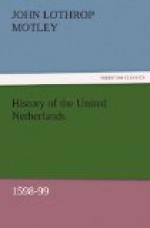Title: History of the United Netherlands, 1598-99
Author: John Lothrop Motley
Release Date: January, 2004 [EBook #4871] [Yes, we are more than one year ahead of schedule] [This file was first posted on April 9, 2002]
Edition: 10
Language: English
Character set encoding: ASCII
*** Start of the project gutenberg EBOOK history United Netherlands, 1598-99 ***
This eBook was produced by David Widger widger@cecomet.net
[Note: There is a short list of bookmarks, or pointers, at the end of the file for those who may wish to sample the author’s ideas before making an entire meal of them. D.W.]
HISTORY OF THE UNITED NETHERLANDS From the Death of William the Silent to the Twelve Year’s Truce—1609
By John Lothrop Motley
MOTLEY’S HISTORY OF THE NETHERLANDS, Project Gutenberg Edition, Vol. 71
History of the United Netherlands, 1598-1599
CHAPTER XXXVI.
Commercial prospects of Holland—Travels of John Huygen van Linschoten Their effect on the trade and prosperity of the Netherlands—Progress of nautical and geographical science—Maritime exploration—Fantastic notions respecting the polar regions—State of nautical science—First arctic expedition—Success of the voyagers—Failure of the second expedition—Third attempt to discover the north-east passage—Discovery of Spitzbergen— Scientific results of the voyage—Adventures in the frozen regions— Death of William Barendz—Return of the voyagers to Amsterdam— Southern expedition against the Spanish power—Disasters attendant upon it—Extent of Dutch discovery.
During a great portion of Philip’s reign the Netherlanders, despite their rebellion, had been permitted to trade with Spain. A spectacle had thus been presented of a vigorous traffic between two mighty belligerents, who derived from their intercourse with each other the means of more thoroughly carrying on their mutual hostilities. The war fed their commerce, and commerce fed their war. The great maritime discoveries at the close of the fifteenth century had enured quite as much to the benefit of the Flemings and Hollanders as to that of the Spaniards and Portuguese, to whom they were originally due. Antwerp and subsequently Amsterdam had thriven on the great revolution of the Indian trade which Vasco de Gama’s voyage around the Cape had effected. The nations of the Baltic and of farthest Ind now exchanged their products on a more extensive scale. and with a wider sweep across the earth than when the mistress of the Adriatic alone held the keys of Asiatic commerce. The haughty but intelligent oligarchy of shopkeepers, which had grown so rich and attained so eminent a political position from its magnificent monopoly, already saw the sources of its grandeur drying up before its eyes, now that the world’s trade—for the first time in human history— had become oceanic.




